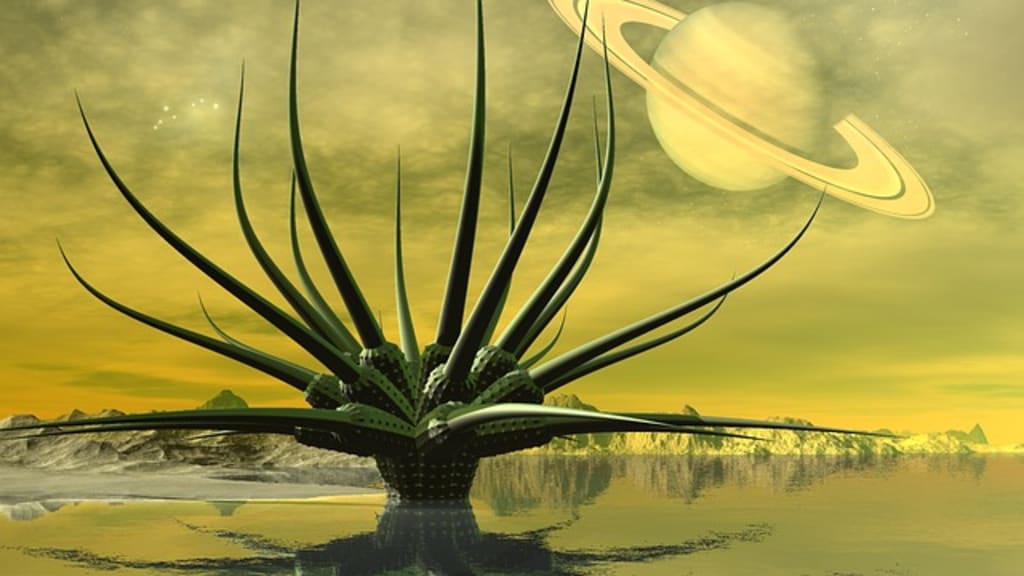Best Hard Sci-Fi Books Focused on Biology
Because not all hard sci-fi is about physics.

Science fiction comes in a number of flavours: Space opera, cyberpunk, post-apocalyptic, afrofuturism, etc. My favourite of these though is hard science fiction, stories in which the science parts are made as realistic as possible. The science might be speculative, the story might feature ideas and technology that doesn’t exist yet, but they should be possible based on the science of today.
Hard Sci-Fi About the Soft and Squishy Stuff
Most hard sci-fi focuses on physics. Space travel involves time dilation, artificial gravity is created by acceleration, and ideas like antimatter drives and dark matter weapons are carefully crafted to conform to the current laws of science.
I enjoy these stories, I love mind-bending physics as much as the next fan. But what really sets my heart a flutter is when someone writes a hard sci-fi story that focuses on biology—what I call hard bio sci-fi. These are stories in which sentient aliens don’t look anything like humans in heavy makeup, where viruses ravage the world in interesting and realistic ways, and where resurrected dinosaurs don’t know how to behave because the scientists forgot to resurrect their culture, too. Often, these stories are written by biologists and doctors.
Hard bio sci-fi is much rarer than other forms of science fiction. It’s a sub-genre with some fantastic stories and some wonderful ideas though, and I urge you to dive into it. Here are my favourites:
Adrian Tchaikovsky has a degree in zoology and an interest in spiders—and it shows. In Children of Time, a group of humans are fleeing a dying Earth on a generation starship. They discover a planet that seems to be a suitable new home, but there’s a problem. It's already inhabited by a sentient species, and one very different from us.
The novel is packed with hard sci-fi ideas, from the problems of keeping generation starships going to how the human mind could be merged with AI. But where the story really shines is in the exploration of how a radically different sentient species could evolve. The development of the alien culture is depicted in fascinating detail, and their biologically-based technology is like nothing else you’ve ever read. There are ideas here that will make you laugh in wonder and glee.
Read it because: You’re interested in seeing the evolution of a sentient species that is very different from humanity. Also, because you either love or hate spiders.
Semiosis begins with a group of human colonists landing on an alien planet that they hope to call home. Initially, it’s a story about how hard it is to start again on an unknown planet. But the colonists realise they aren’t alone, and that they’re sharing this new world with sentient plants.
Like Children of Time, this is a first contact story where the alien species is radically different from us. But Semiosis takes a very different focus. The story explores how the human settlers learn to live in symbiosis with the alien plant life, and Burke shows us the development of a society based on cooperation, rather than conflict and the domination of other species… or does she? The extent to which the two parties are cooperating or being exploited by each other is kept intentionally vague, and it adds a wonderful sense of tension to the story.
Read it because: You never realised how complex and interesting plant life can be (trust me, it’s absolutely fascinating). And because you want to see the world through the eyes of a humongous sentient bamboo.
Peter Watts is an ex-marine biologist and he’s the master of hard bio sci-fi. Pretty much everything he’s written could be taken as an example of the sub-genre at its best, and if you like hard bio sci-fi, then you really should read everything he’s ever written. Seriously. Treat yourself.
Blindsight is Watt’s best piece of work though. It’s the hard bio sci-fi equivalent of crack cocaine—there’s a new idea on pretty much every page, and it’ll make you feel exhilarated and dizzy that so much cool science has been squeezed into one story. On the face of it, Blindsight is the tale of a ship of humans making first contact with a radically different alien species. But it’s also an exploration of consciousness, and how you could possibly have intelligence without it. Yep, intelligence without consciousness. Strap in.
Oh, also there’s vampires. But these aren’t vampires that sleep in wooden coffins or have sparkly diamond skin. These are the most biologically and ecologically realistic vampires you’ve ever encountered. They feel real, and they’re scary. It’s a wonderful piece and daring to write such a hard science fiction novel—and to include a mythical creature in it.
Read it because: You want to bathe in a torrent of fantastical hard bio science fiction ideas. You want to discover the best depiction of vampires in all of fiction, ever.
I said Peter Watts was the master of hard bio sci-fi and that you should read all his work, but Starfish also deserves a special mention. The story is set in the near future where a corporation has bio-engineered humans so they can live on the bottom of the ocean in order to run geothermal power stations.
The story explores the lives of these people, and what it takes to live in such harsh conditions. The setting is cold, dark, and dangerous, and so are most of the characters. That may put off some readers, but the story is tense and atmospheric, and reading it, you really feel like you’re living on the bottom of the Pacific Ocean. If that appeals, then pick this up.
The community makes a discovery on the ocean floor that has profound implications for the surface world. It’s a cool idea, and the subsequent events form the backbone of the two other great novels in this trilogy.
Read it because: You’ve always wanted to escape the surface world to live in peace on the bottom of the ocean. There are also two great sequels, and overall, it’s a really interesting trilogy.
Another entry by the talented Adrian Tchaikovsky. It’s very difficult for me to say anything about this story without spoiling it, as all is not what it seems, and you only really understand what’s going on at the end. If I told you too much, I’d ruin it.
All I’ll say is that it’s a novella-length story that explores how biotechnology could be used to create an idyllic pastoral society. Almost like a return to Eden. Or is it?
Like a Peter Watts story, this is absolutely jam-packed with interesting ideas. You’ll likely be enthralled and confused for much of it. But once you get to the end, and all is revealed, everything suddenly makes sense and you’ll be stunned at the vision of it.
Read it because: It’s so well-written you won't be able to put it down once you start. Once it’s revealed to you what’s happened, you’ll grin in wonder and you’ll think about it for weeks afterwards.
You could debate whether this is truly a hard bio sci-fi story. The creation of the Windup Girl herself is never properly explained, and the science sits in the background of the story rather than the foreground. I’ve included The Windup Girl though as it’s a future world that feels biologically feasible to me.
The story is set in a near-future Bangkok where oil has run out and climate change is rampant. Most important for the setting though, is that bioengineered crops, pests, and diseases have ravaged the world and many plant species have gone extinct; including most of the ones we eat. No more tomatoes, bananas, apples etc. It’s a future where electricity and calories are hard to come by and it shows you just how good we have it today.
The Windup Girl is about how as one society collapses, a new one can rise to take it’s place, which feels relevant in a time when things are starting to show the early signs of breakdown. It’s also written in such a wonderfully vivid way that you’ll feel like you’re in a future Bangkok in the same way that Neuromancer made you feel like you were in a future Tokyo.
Read it because: You’re preparing for the coming food wars. And because you want to feel like you’re living in a near-future Thailand.
Again, this one is debatable. The Lost World is the sequel to Jurassic Park. Now, the science of Jurassic Park isn’t feasible, I know that. DNA can be extracted from animals trapped in amber, but DNA can’t be recovered from animals as old as the dinosaurs. It’s not going to happen.
But the science is close to being feasible, and it’s such a wonderful idea that I’m including it. Particularly as scientists have recovered the genomes for some extinct species today, and whether or not we should resurrect them is a current topic for debate, so Jurassic Park feels scientifically relevant today.
I’m recommending the sequel though, as it has some really interesting ideas on the cultures of other animal species. The book shows that you can resurrect the biological organism, but not necessarily the way they behave and interact with each other, and how this can cause further problems. You don't have to have read the original book if you’ve seen the film to read this, although the novel of Jurassic Park is interesting too. And don’t worry, this book is very different from the film which shares its name.
Read it because: Dinosaur cultures. Do you really need any other excuse?
Another Michael Crichton entry. The Andromeda Strain was one of Crichton’s earliest novels, and arguably his most science-focussed. It’s the story of a team of scientists racing to find a cure for an extra-terrestrial virus before it decimates the world.
This is a very science focussed story. Very. Whilst the characters do feel real and rounded, there are no sub-plots, no romances, no personal daemons to be vanquished, just a group of scientists working in a laboratory to stop a deadly epidemic. That might not be everyone’s cup of tea, but I like how focussed the book is. It’s scientists doing science things in science settings.
Read it because: You want to read a piece of pure, convincing Hard Bio SF.
I hesitated to recommend Solaris, and I feel like a sci-fi philistine for admitting this, but I found Solaris a difficult read. I like slow plot development and an atmosphere that makes you feel oppressed and anxious as you read, but Solaris takes this to extremes. It’s tortuously slow, the characters are odd, and the writing is stilted. But—and this is a big but—Solaris has one very important thing going for it: It features possibly the best alien life form in all of science fiction.
Aliens in sci-fi can sometimes be less than inspiring. Often they’re like us, but a bit different with a head crest or differently shaped ears. Even Geiger’s wonderful xenomorph is a bipedal humanoid. But if complex alien life is out there, the chances of it looking like us are slim. Chances are, it’d be so different we wouldn’t be able to understand each other. We may not even recognise it as life. This is what Solaris does better than any other hard bio sci-fi I’ve ever read. Is the alien in Solaris sentient? Is it even alive? Is it trying to communicate with the scientists studying it? Or is what’s happening some sort of weird side effect?
These questions are why Solaris is so brilliant.
Read it because: You want to meet the most alien of aliens in all of science fiction.
We'll end on another classic. Whilst the science of Brave New World feels outdated today, at the time it was written it was plausible, and because of this, I think the novel counts—perhaps, as retro hard bio science fiction?
The story is set in AD 2540 where a monolithic state rules the world. The citizens of the state undergo biological and psychological manipulation to ensure they develop into happy and productive citizens who love their station in life and their vocations. On the surface, it looks like the perfect utopia—the citizens love their work and they have plenty of leisure time, sex, drugs, and fun. Super. But in reality, the citizens have no freedom, and for those who don’t conform, life is far from perfect. It’s a world in which you can have happiness as long as you surrender your individuality and your liberty.
Brave New World was written in 1931, but it still feels relevant today. Whereas in other future dystopias, like 1984, the powerful rule through oppression and violence, in Brave New World Huxley shows this isn’t necessary. All you need is some bio-engineering, and also plenty of consumerism, and work, and sports, and sex, and drugs, and endless diversions. Sound familiar? Sound a bit like what’s happening today? Perhaps not the bioengineering, but the rest?
Read it because: You want to visit an alternative future dystopian society—one that’s superficially happy and shiny and wonderful, of which makes it all the more frightening.
About the Creator
Dan Swindlehurst
I'm a writer, a geek, and a big fan of science and science fiction. Find me on@SwindleApe if you'd like to talk about anything I've written.






Comments
There are no comments for this story
Be the first to respond and start the conversation.